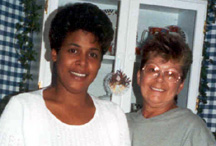 |
Tina Spencer, left, with her mother, Sue. |
But, since her mother, Sue, was diagnosed with breast cancer in July, mother-daughter have talked nearly every day – and sometimes two or three times a day – via phone and e-mail.
Spencer also has been traveling to Springfield, Ohio, each month to help her mother go through that month’s second round of chemotherapy treatments or just spend time with her. At the same time, she is juggling her responsibilities as a wife, mother to two daughters and manager of UNMC’s Parking & Cashiering Services.
“The difficult part is the miles between us because I feel helpless even though mom gets care and support there,” Spencer said. “It’s difficult balancing my Nebraska vs. Ohio responsibilities.”
|
The “Accessing Eldercare Services and Information” event will feature four presentations in the Eppley Science Hall Amphitheater from 10:45 a.m. to 1:15 p.m., and exhibits in the UNMC Center for Continuing Education Atrium (inside the Eppley Science Hall) from 10 a.m. to 2 p.m. There will be free sack lunches to the first 100 employees who attend. |
“It helped me that she was being treated at The Nebraska Medical Center and UNMC,” Russell said. “It really made it a lot smoother to have her right here.”
For seven weeks this summer, Russell would bring his mother to campus daily for her early morning chemotherapy treatment, then go to his office until the nurses called to say her treatment was finished. Russell would then drive his mother to west Omaha and meet his wife who would take her to the couple’s Ashland home, while Russell returned to work.
Today, Marilyn Russell, 81, is back in Hebron, chauffeuring her friends and “doing fantastic,” Russell said.
The yearlong experience highlighted several lessons, Russell said, including:
- The importance of expecting the unexpected and staying flexible and adaptable.
- The difficulty and time involved in organizing and coordinating transportation. Russell suggests that caregivers contact local aging offices to see if they have transportation services.
- The difficulty in deciphering medical bills, especially for the elderly. Russell suggests contacting billing offices with questions.
- The importance of children knowing what insurance their parents have, including whether they have supplemental coverage. Parents may want to discuss possible policy changes with their children before enacting them to ensure that they don’t drop coverage they may need later.
- The difficulty of navigating a large hospital.
- The challenges that arise when children take on the roles of their parents in eldercare situations.
Eldercare experiences also shift your priorities, Spencer said. “I try to keep in perspective that I can’t do everything,” she said. “Some things have to give. It’s like when you have a new baby and try to keep the house clean, but can’t get to it once a week.”
The youngest of four children, Spencer has one brother in Texas and another in Ohio — only three hours from her parents. Her father and sister live in Springfield and have assumed much of the day-to-day care since her mother’s diagnosis and lumpectomy.
“Still, my father doesn’t have any medial expertise or background so I’m the one they call on,” Spencer said. “I have contacts here who help me with questions and information.”
Meanwhile, Spencer and her sister are planning a February cruise to Mexico with their mother, who begins 35 days of radiation upon their return home. “Even though it’s treatable I still don’t sleep well every night,” Spencer said.
Her advice to other eldercare givers: “Don’t be afraid to ask for help and don’t be afraid to accept help.”